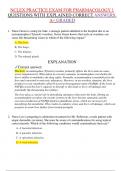NCLEX PRACTICE EXAM FOR PHARMACOLOGY 1
QUESTIONS WITH EXPLAINED CORRECT ANSWERS.
A+ GRADED
1. Nurse Green is caring for Jake, a teenage patient admitted to the hospital due to an
acetaminophen (Tylenol) overdose. Nurse Green knows that such an overdose can
cause life-threatening issues in which of the following organs?
A. The liver.
B. The lungs.
C. The kidneys.
D. The adrenal glands.
EXPLANATION
✔Correct answer:
The liver. Acetaminophen (Tylenol) overdose primarily affects the liver and can cause
severe hepatotoxicity. When taken in excessive amounts, acetaminophen overwhelms the
liver's ability to metabolize the drug safely. Normally, acetaminophen is metabolized in the
liver and converted to non-toxic substances. However, in an overdose situation, the liver
produces a toxic metabolite called N-acetyl-p-benzoquinone imine (NAPQI). If the levels of
NAPQI exceed the liver's capacity to detoxify it, this leads to liver cell damage and
potentially life-threatening liver failure.
The liver plays a crucial role in detoxifying substances that enter the body. During an
acetaminophen overdose, the enzyme systems in the liver become saturated, and the
excessive production of NAPQI depletes glutathione stores, which are necessary for
detoxifying this metabolite. This results in oxidative stress and liver cell damage, which can
progress to acute liver failure if not treated promptly.
2. Nurse Lee is preparing to administer treatment for Mr. Robinson, a male patient with
atopic dermatitis (eczema). She must be aware of contraindications for using topical
corticosteroids. Which of the following conditions would contraindicate their use?
A. A bacterial infection.
B. A parasitic infection.
C. A spirochete infection.
D. A viral infection.
, EXPLANATION
✔Correct answer:
A viral infection. Topical corticosteroids are contraindicated in the presence of viral
infections because they can suppress the local immune response, potentially worsening the
infection. Viral infections, such as herpes simplex or varicella (chickenpox), can proliferate
if the immune system's ability to control viral replication is impaired by corticosteroid use.
This can lead to more extensive skin involvement and complications.
Corticosteroids work by reducing inflammation and immune response. While this is
beneficial in conditions like atopic dermatitis, where inflammation is a key problem, it can
be detrimental in the presence of a viral infection. The suppression of the immune response
can allow the virus to replicate more freely, exacerbating the infection and potentially
leading to systemic involvement
3. Nurse Taylor is assessing a 13-month-old child who recently arrived in the United
States and needs childhood immunizations. The child's mother mentions that he has a
severe anaphylactic allergy to eggs. Based on this information, which vaccine should
the child avoid?
A. Diphtheria, acellular pertussis, tetanus (DTaP).
B. Mumps, measles, rubella (MMR).
C. Hepatitis B.
D. Inactivated polio.
EXPLANATION
✔Correct answer:
Mumps, measles, rubella (MMR). The Mumps, Measles, and Rubella (MMR) vaccine is of
particular concern for individuals with a severe anaphylactic allergy to eggs. Historically,
there was concern that the MMR vaccine, which is grown in chick embryo fibroblast
cultures, might cause allergic reactions in individuals with egg allergies. However, current
evidence suggests that the MMR vaccine can generally be administered safely to
individuals with egg allergies. Still, caution is warranted in cases of severe anaphylactic
reactions to eggs.
Anaphylactic reactions to eggs are due to the proteins present in egg whites, particularly
ovalbumin. Although the MMR vaccine is produced using chicken embryo fibroblast
cultures, it contains only trace amounts of egg protein, typically not enough to trigger an
anaphylactic reaction. Nonetheless, healthcare providers often exercise caution with this
vaccine in children with severe egg allergies, especially if the allergy involves anaphylaxis.
4. Nurse Elena is preparing a blood transfusion for a severely immunocompromised
female patient. To prevent graft-versus-host disease (GVHD), the physician issues
specific orders. What measure will the physician likely include?
, A. Administration of diphenhydramine hydrochloride (Benadryl).
B. Irradiation of the donor blood.
C. Administration of acetaminophen (Tylenol).
D. Conducting the transfusion slowly over several hours.
EXPLANATION
✔Correct answer:
Irradiation of the donor blood. To prevent graft-versus-host disease (GVHD) in a severely
immunocompromised patient, the physician will likely include the measure of irradiating
the donor blood. GVHD occurs when donor lymphocytes (white blood cells) attack the
recipient's tissues. This is particularly dangerous in immunocompromised patients who
cannot effectively fight off these foreign cells. Irradiation of blood products inactivates
these lymphocytes, preventing them from proliferating and causing GVHD.
GVHD is a serious and potentially life-threatening condition in which the immune cells in
the transfused blood (graft) recognize the recipient's (host) body as foreign and mount an
immune response against it. This condition is most likely to occur in immunocompromised
individuals because their weakened immune systems are less capable of fighting off the
donor lymphocytes. By irradiating the blood, the lymphocytes are rendered incapable of
dividing and initiating an immune response, thus preventing GVHD.
5. Nurse Roberts is monitoring a patient on levothyroxine (Synthroid) therapy for
potential adverse effects. Which of the following is commonly associated with this
medication?
A. Having hypotension.
B. Experiencing constipation.
C. Developing bradycardia.
D. Experiencing tachycardia.
EXPLANATION
✔Correct answer:
Experiencing tachycardia. Levothyroxine (Synthroid) is a synthetic form of the thyroid
hormone thyroxine (T4) and is used to treat hypothyroidism, a condition where the thyroid
gland does not produce enough thyroid hormone. One of the commonly associated adverse
effects of levothyroxine, especially if the dosage is too high, is tachycardia (an abnormally
fast heart rate). This occurs because thyroid hormones increase the overall metabolic rate
and the activity of the sympathetic nervous system, leading to increased heart rate and
potentially other symptoms of hyperthyroidism.
Thyroid hormones play a critical role in regulating metabolism, growth, and development.
They increase the basal metabolic rate, which leads to increased oxygen consumption and




